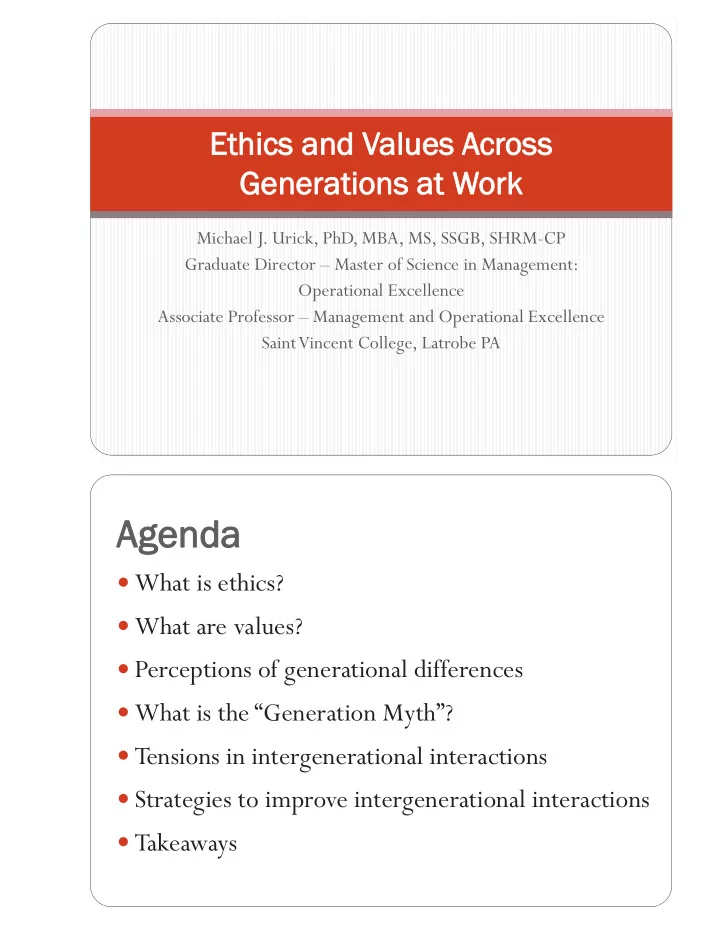

Ethics and Values Across Generations at Work Michael J. Urick, PhD, MBA, MS, SSGB, SHRM-CP Graduate Director – Master of Science in Management: Operational Excellence Associate Professor – Management and Operational Excellence Saint Vincent College, Latrobe PA Agenda � What is ethics? � What are values? � Perceptions of generational differences � What is the “Generation Myth”? � Tensions in intergenerational interactions � Strategies to improve intergenerational interactions � Takeaways
What Is Ethics? � Decision making � Managing grey areas Ethics � The study of ethics = the study of decision making � Why do we make the decisions that we make? � According to whose values?
Whose Values? � Personal � Informed by “identity” influencers (i.e. how we define ourselves) � Political beliefs � Family values � Religion � Likes and dislikes � Organizational � Mission statement � Vision statement � Organizational culture � Broader � Community � Society Why/How Do We Choose To Behave In An Ethical Manner? Moral Moral Moral Behavior awareness judgment intent
Moral Judgement Moral Principles General Specific principle principle Description Consequentialist Utilitarianism Provides the greatest good for the greatest number (judge morality of an action by its outcomes ) Egoism Boosts the short-term or long-term interests of the company Non- Ethics of duties Fulfills these rules: (a) should be performed by consequentialist everyone; (b) should respect human dignity; (c) (judge morality of an should be endorsable by others action by its intrinsic desirability ) Ethics of rights Respects basic rights (life, liberty, privacy, etc.) Virtue ethics Adheres to virtues (wisdom, honesty, courage, mercy, etc.) Generational Differences � Categories � Y (Millennials) � X � Baby Boomers � Veterans (Silents) � Popularized by media � Generalizability in question � Perceptions of generations � Differences assumed to cause conflict
Recent Research � Examining the Millennials’ Ethical Profile: Assessing Demographic Variations in Their Personal Value Orientations (2017) � James Weber (Duquesne University) and Michael Urick (Saint Vincent College) � Business and Society Review “This research dissects the Millennial’s personal value orientations (PVO) to explore if demographic differences, such as gender, amount of work experience, business discipline specialization, and academic performance reveal variations in the ethical profile manifested by Millennials. The results from this research show that there are indeed numerous and significant statistical differences within the Millennials’ PVO dataset. Variations are found when exploring nearly every demographic variable considered.” How You View Generations Depends on Your “Lenses”
Influencing Perceptions � Societal influences � Economic factors � Political/societal events and climate � Media � Work context � Workplace characteristics � Work experience � Individual characteristics � Personality and traits � Maturity level � Family upbringing Media Example “I don’t know how many Gen Y there are, but I’m sure there’s some not good ones out there. And they’re going to find those and try and get those stories out in the media. And that’s just what they do.”
Identity � Definition � Self- and other-definitional in nature � Who am I? Who are we? Who am “I” in context of “we”? � Types of identities � Identities set perceptions and expectations Introducing “The Generation Myth” The elusive connection between birth year, or belonging to a generational label, and most of an individual’s behaviors or values.
Tensions From Perceived Generational Differences � Values-based � Status quo v. innovation � Traditional v. progressive � Behavior-based � Earned v. entitled � High tech v. low tech � Skilled v. unskilled communication � Identity-based � Me v. we � Single v. multiple identities Behavior-based Example “The communication skills of some of the younger people that I meet on a weekly basis are absolutely nil. There are absolutely no communication skills because they learn how to communicate via Twitter and talk in abbreviated words and abbreviated sentences. So if I had to communicate at any length of time with someone in their 20s, I probably couldn’t.”
Strategies to Alleviate Tension � Achievement-oriented � Focusing on communication style � Performing proficiently � Image-oriented � Being visible � Managing information to control image � Ego-oriented � Protecting needs � Removing self
Achievement-oriented Example “With an Executive Vice President in New York. I think it was my first four months working for the company and he was really challenging me on my knowledge of what I was doing. And then, ‘Well, how old are you, (interviewee’s name)?’ And I said, ‘You know, I don’t think age is a measure of my skill. If I’m able to produce for you, then that’s what we need to talk about.’ I think that really helps get me past that barrier of him questioning my skill set. I think he kind of knew that I was younger. The gentleman was probably in his early 60s and, like I said, his daughter or son were [sic] probably older than me, but from then on I was able to establish myself in the business. Just knowing what I’m doing rather than how many years of experience that I have.”
Take-Aways � In your role, ethical decision making is likely something you engage in on a daily basis � Values inform our ethical decisions � Different generations are often perceived to possess different values; these perceptions can lead to conflict and interaction challenges � Consider whether some of the strategies can help you � Without positive interactions we will see lack of knowledge transfer/mentorship and caustic cultures � See the individual, not the stereotype � Mindfulness of influences � Question assumptions � Are we more similar or different? Contact Mike Michael J. Urick, PhD, MBA, MS, SSGB, SHRM-CP � 724-805-2654 � michael.urick@stvincent.edu � http://info.stvincent.edu/faculty-blog/author/michael-urick � http://www.stvincent.edu/msmoe/ � http://www.michaelurick.com/ On social media: � www.facebook.com/urickmj � www.linkedin.com/pub/michael-urick/a3/775/5b/ � www.facebook.com/svcmsmoe
Recommend
More recommend